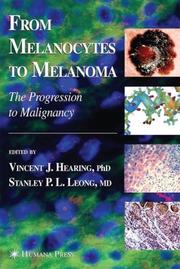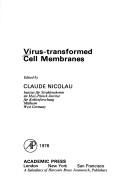| Listing 1 - 9 of 9 |
Sort by
|

ISBN: 1280832908 9786610832903 159259994X 1588294595 Year: 2006 Publisher: Totowa, N.J. : Humana Press,
Abstract | Keywords | Export | Availability | Bookmark
 Loading...
Loading...Choose an application
- Reference Manager
- EndNote
- RefWorks (Direct export to RefWorks)
Melanoma offers an excellent model for cancer biology and an opportunity to understand the progression of a normal skin cell-the melanocyte-to malignancy. In From Melanocytes to Melanoma: The Progression to Malignancy, leading researchers and clinicians join forces to explain how skin cancer develops from its benign precursor cell type. The authors focus on the molecular mechanisms involved in melanogenesis, the malignant transformation of melanocytes, and the further progression of primary melanomas into invasive and metastatic melanomas. They also review recent advances in our understanding of the basic biology of melanocytes and the development, migration, and differentiation of melanoblasts into melanocytes. The text is augmented by four color plates. Comprehensive and illuminating, From Melanocytes to Melanoma: The Progression to Malignancy, provides pathologists, dermatologists, surgeons, and medical oncologists with an up-to-date understanding of the progressive mechanisms of oncological development in malignant melanoma, a likely model of malignant progress for other types of cancer, and the ongoing development of novel therapeutics.
Melanoma. --- Cell transformation. --- Melanocytes. --- Melanin-synthesizing cells --- Epithelial cells --- Culture alteration (Cytology) --- Transformation of cells --- Tissue culture --- Malignant melanoma --- Melanocytic tumor --- Cancer --- Neuroendocrine tumors --- Oncology . --- Oncology. --- Tumors
Book
ISBN: 1461402530 9786613351968 128335196X 1461402549 Year: 2011 Publisher: New York : Springer,
Abstract | Keywords | Export | Availability | Bookmark
 Loading...
Loading...Choose an application
- Reference Manager
- EndNote
- RefWorks (Direct export to RefWorks)
Rhim and Kremer’s state-of-the-art volume on Human Cell Transformation: Role of Stem Cells and the Microenvironment highlights the latest findings on the current state of human cell transformation model systems and provides the insight into the molecular and cellular changes involved in the conversion of normal cells to neoplastic cells. Chapters cover all recently developed novel human cell models. In addition, the rapidly growing fields of knowledge regarding not only stem cells in cancer progression, but also the role of the microenvironments in human carcinogenesis are discussed. A wealth of topics is presented including: · Derivation of epithelial, fibroblastic, and hematopoietic in vitro model systems · Oncogenes · Tumor suppressor genes · Viral transformation · In vitro model systems for viral, chemical and radiation carcinogenesis · Cell aging · The multistep nature of human carcinogenesis · The role of stem cells and the microenvironment in tumorigenesis · The genes involved in multistep carcinogenesis Unique in both scope and focus – devoted solely to human cell transformation systems – Human Cell Transformation: Role of Stem Cells and the Microenvironment provides unparalleled, in-depth coverage for cancer researchers, cell and molecular biologists, hematologists, virologists, and workers in related fields. Essential reading for everyone who needs to be kept up-to-date in this fast-paced area! Features Ø Multistep models Ø Breast cancer/Stem cells Ø Prostate cancer/Stem cells Ø Multistep / Genes.
Cell transformation -- Congresses. --- Cell Transformation, Neoplastic. --- Cellular Microenvironment. --- Stem Cells. --- Stem cells -- Congresses. --- Cell transformation --- Human cell culture --- Publication Formats --- Cells --- Neoplastic Processes --- Publication Characteristics --- Anatomy --- Pathologic Processes --- Neoplasms --- Pathological Conditions, Signs and Symptoms --- Diseases --- Congresses --- Cells, Cultured --- Stem Cells --- Cell Transformation, Neoplastic --- Biology --- Health & Biological Sciences --- Cytology --- Cell transformation. --- Human cell culture. --- Culture alteration (Cytology) --- Transformation of cells --- Life sciences. --- Cell biology. --- Stem cells. --- Life Sciences. --- Cell Biology. --- Colony-forming units (Cells) --- Mother cells --- Progenitor cells --- Cell biology --- Cellular biology --- Cytologists --- Biosciences --- Sciences, Life --- Science --- Cell culture --- Tissue culture --- Cytology.

ISBN: 0126129770 1322204969 148326212X 9780126129779 Year: 1974 Volume: 32 Publisher: New York (N.Y.): Academic press,
Abstract | Keywords | Export | Availability | Bookmark
 Loading...
Loading...Choose an application
- Reference Manager
- EndNote
- RefWorks (Direct export to RefWorks)
Immunology. Immunopathology --- General embryology. Developmental biology --- Carcinogenesis --- Cancer --- Cell transformation --- Carcinogens --- Cell Transformation, Neoplastic --- Neoplasms --- Congresses --- Immunological aspects --- congresses --- Etiology --- Immunology --- Carcinogens. --- Cell Transformation, Neoplastic. --- -Carcinogenesis --- -Cell transformation --- -Culture alteration (Cytology) --- Transformation of cells --- Tissue culture --- Oncogenesis --- Pathogenesis of cancer --- Tumorigenesis --- Pathology --- Genetic toxicology --- Cancers --- Carcinoma --- Malignancy (Cancer) --- Malignant tumors --- Tumors --- Neoplastic Cell Transformation --- Transformation, Neoplastic Cell --- Tumorigenic Transformation --- Neoplastic Transformation, Cell --- Cell Neoplastic Transformation --- Cell Neoplastic Transformations --- Cell Transformations, Neoplastic --- Neoplastic Cell Transformations --- Neoplastic Transformations, Cell --- Transformation, Cell Neoplastic --- Transformation, Tumorigenic --- Transformations, Cell Neoplastic --- Transformations, Neoplastic Cell --- Transformations, Tumorigenic --- Tumorigenic Transformations --- Cell Line, Transformed --- Oncogens --- Tumor Initiators --- Tumor Promoters --- Initiators, Tumor --- Promoters, Tumor --- Benzidines --- etiology. --- immunology. --- -Congresses --- Pathogenesis --- -etiology. --- Immunological aspects&delete& --- etiology --- immunology --- Carcinogen --- Oncogen --- Tumor Initiator --- Tumor Promoter --- Initiator, Tumor --- Promoter, Tumor --- Carcinogenesis - Congresses --- Cancer - Immunological aspects - Congresses --- Cell transformation - Congresses --- Carcinogens - congresses --- Cell Transformation, Neoplastic - congresses --- Neoplasms - Etiology - Congresses --- Neoplasms - Immunology - Congresses

ISBN: 0444808272 Year: 1987 Publisher: Amsterdam
Abstract | Keywords | Export | Availability | Bookmark
 Loading...
Loading...Choose an application
- Reference Manager
- EndNote
- RefWorks (Direct export to RefWorks)
Oncology. Neoplasms --- Human genetics --- Molecular biology --- Human embryology --- Cell Transformation, Neoplastic --- Growth Substances --- Oncogenes --- Receptors, Endogenous Substances --- collected works --- Cell Transformation, Neoplastic. --- Intercellular Signaling Peptides and Proteins. --- Oncogenes. --- Receptors, Cell Surface. --- Cell Surface Hormone Receptors --- Endogenous Substances Receptors --- Cell Surface Receptors --- Hormone Receptors, Cell Surface --- Binding Sites --- Hormones --- Ligands --- Receptor Cross-Talk --- Oncogene --- Transforming Gene --- Transforming Genes --- Gene, Transforming --- Genes, Transforming --- Growth Factors --- Paracrine Peptide Factors --- Paracrine Protein Factors --- Peptide Factors, Paracrine --- Paracrine Communication --- Peptide Hormones --- Neoplastic Cell Transformation --- Transformation, Neoplastic Cell --- Tumorigenic Transformation --- Neoplastic Transformation, Cell --- Cell Neoplastic Transformation --- Cell Neoplastic Transformations --- Cell Transformations, Neoplastic --- Neoplastic Cell Transformations --- Neoplastic Transformations, Cell --- Transformation, Cell Neoplastic --- Transformation, Tumorigenic --- Transformations, Cell Neoplastic --- Transformations, Neoplastic Cell --- Transformations, Tumorigenic --- Tumorigenic Transformations --- Cell Line, Transformed --- Receptors, Cell Surface --- collected works. --- Cell transformation --- Growth factors --- Intercellular Signaling Peptides and Proteins --- Onc genes --- Cancer genes --- Proto-oncogenes --- Cell growth factors --- Cellular growth factors --- Growth peptides --- Growth promoting substances --- Growth substances --- Peptide growth factors --- Peptide regulatory factors --- Polypeptide growth factors --- Cytokines --- Peptides --- Culture alteration (Cytology) --- Transformation of cells --- Tissue culture --- Growth Factor --- Factor, Growth --- Factors, Growth --- Cell Surface Receptor --- Receptor, Cell Surface --- Surface Receptor, Cell
Book
ISBN: 0897660870 0897660889 9780897660884 9780897660877 Year: 1980 Volume: 349 Publisher: New York (N.Y.): New York Academy of Sciences,
Abstract | Keywords | Export | Availability | Bookmark
 Loading...
Loading...Choose an application
- Reference Manager
- EndNote
- RefWorks (Direct export to RefWorks)
Oncology. Neoplasms --- Gastroenterology --- Carcinogenesis --- Liver cells --- Cell transformation --- Cell culture --- Congresses --- Differentiation --- Carcinogens. --- Cell Differentiation. --- Cell Transformation, Neoplastic. --- Cells, Cultured. --- Liver Neoplasms, Experimental --- Liver --- -Cell culture --- -Cell transformation --- -Liver cells --- -#Lilly --- Hepatic cells --- Hepatocytes --- Cells --- Culture alteration (Cytology) --- Transformation of cells --- Tissue culture --- Cultures (Biology) --- Cytology --- Cancer --- Oncogenesis --- Pathogenesis of cancer --- Tumorigenesis --- Pathology --- Genetic toxicology --- Cultured Cells --- Cell, Cultured --- Cultured Cell --- Organ Culture Techniques --- Coculture Techniques --- Cell Culture Techniques --- Culture Techniques --- Human Umbilical Vein Endothelial Cells --- Neoplastic Cell Transformation --- Transformation, Neoplastic Cell --- Tumorigenic Transformation --- Neoplastic Transformation, Cell --- Cell Neoplastic Transformation --- Cell Neoplastic Transformations --- Cell Transformations, Neoplastic --- Neoplastic Cell Transformations --- Neoplastic Transformations, Cell --- Transformation, Cell Neoplastic --- Transformation, Tumorigenic --- Transformations, Cell Neoplastic --- Transformations, Neoplastic Cell --- Transformations, Tumorigenic --- Tumorigenic Transformations --- Cell Line, Transformed --- Differentiation, Cell --- Cell Differentiations --- Differentiations, Cell --- Embryo, Mammalian --- Gene Expression Regulation --- Cell Lineage --- Oncogens --- Tumor Initiators --- Tumor Promoters --- Initiators, Tumor --- Promoters, Tumor --- Benzidines --- chemically induced. --- cytology. --- -Congresses --- Technique --- Pathogenesis --- Carcinogens --- Cell Differentiation --- Cells, Cultured --- Cell Transformation, Neoplastic --- #Lilly --- Differentiation&delete& --- chemically induced --- cytology --- Carcinogen --- Oncogen --- Tumor Initiator --- Tumor Promoter --- Initiator, Tumor --- Promoter, Tumor --- Carcinogenesis - Congresses --- Liver cells - Differentiation - Congresses --- Cell transformation - Congresses --- Cell culture - Congresses
Periodical
ISSN: 15417786 15573125 Publisher: Philadelphia (Pa.) : American association for cancer research,
Abstract | Keywords | Export | Availability | Bookmark
 Loading...
Loading...Choose an application
- Reference Manager
- EndNote
- RefWorks (Direct export to RefWorks)
Molecular Cancer Research publishes original, novel, and well-designed studies on the molecular and cellular aspects of cancer biology. Papers should represent significant new information gathered from basic research that has implications for cancer therapeutics in one of the following areas: Angiogenesis, Metastasis, and the Cellular Microenvironment; Cancer Genes and Genomics; Cell Cycle, Cell Death, and Senescence; DNA Damage and Cellular Stress Responses; Model Organisms; and Signaling and Regulation.
Oncology. Neoplasms --- Cells --- Cell differentiation --- Cancer cells --- Cell transformation --- Cancer --- Cell Differentiation. --- Cell Transformation, Neoplastic. --- Molecular Biology. --- Neoplasms. --- Cell differentiation. --- Cell transformation. --- Growth --- Molecular aspects --- Growth. --- Molecular aspects. --- Cell Differentiation --- Cell Division --- Cellules cancéreuses --- Cellules --- Health Sciences --- Immunology --- Aspect moléculaire --- Croissance --- Différenciation --- Division --- Transformation --- Clinical Medicine --- Oncology --- Cells. --- Research. --- Laboratory Research --- Research Activities --- Research and Development --- Research Priorities --- Activities, Research --- Activity, Research --- Development and Research --- Priorities, Research --- Priority, Research --- Research Activity --- Research Priority --- Research, Laboratory --- Ethics, Research --- Cell --- Cell Biology --- Benign Neoplasms --- Malignancy --- Neoplasia --- Neoplasm --- Neoplasms, Benign --- Tumors --- Benign Neoplasm --- Cancers --- Malignancies --- Neoplasias --- Neoplasm, Benign --- Tumor --- Medical Oncology --- Biochemical Genetics --- Biology, Molecular --- Genetics, Biochemical --- Genetics, Molecular --- Molecular Genetics --- Biochemical Genetic --- Genetic, Biochemical --- Genetic, Molecular --- Molecular Genetic --- Genetic Phenomena --- Periodicals --- Health Sciences. --- Immunology. --- Neoplastic Cell Transformation --- Transformation, Neoplastic Cell --- Tumorigenic Transformation --- Neoplastic Transformation, Cell --- Cell Neoplastic Transformation --- Cell Neoplastic Transformations --- Cell Transformations, Neoplastic --- Neoplastic Cell Transformations --- Neoplastic Transformations, Cell --- Transformation, Cell Neoplastic --- Transformation, Tumorigenic --- Transformations, Cell Neoplastic --- Transformations, Neoplastic Cell --- Transformations, Tumorigenic --- Tumorigenic Transformations --- Cell growth --- Culture alteration (Cytology) --- Transformation of cells --- Cell fate specification --- Cell specification --- Differentiation of cells --- Fate specification of cells --- Specification of cells --- Cancer cell growth --- Carcinoma --- Malignancy (Cancer) --- Malignant tumors --- Differentiation --- Fate specification --- Specification --- Cell Transformation, Neoplastic --- Molecular Biology --- Neoplasms --- Differentiation, Cell --- Cell Differentiations --- Differentiations, Cell --- Research --- Malignant Neoplasms --- Malignant Neoplasm --- Neoplasm, Malignant --- Neoplasms, Malignant --- Cell proliferation --- Tissue culture --- Morphogenesis --- Pathology, Cellular --- Organisms --- Cytology --- Cell Line, Transformed --- Embryo, Mammalian --- Gene Expression Regulation --- Cell Lineage --- Différenciation.
Periodical
ISSN: 10449523 Publisher: Philadelphia (Pa.) : American association for cancer research,
Abstract | Keywords | Export | Availability | Bookmark
 Loading...
Loading...Choose an application
- Reference Manager
- EndNote
- RefWorks (Direct export to RefWorks)
Cells --- Cell differentiation --- Cell division --- Cancer cells --- Cell transformation --- Cancer --- Cellules --- Cellules cancéreuses --- Cell Differentiation --- Cell Division --- Growth --- Periodicals --- Periodicals. --- Molecular aspects --- Croissance --- Périodiques --- Différenciation --- Division --- Transformation --- Aspect moléculaire --- Cell Division. --- Molecular Biology. --- Neoplasms, Experimental. --- Cell Biology. --- Medical Oncology. --- Cell differentiation. --- Cell transformation. --- Growth. --- Molecular aspects. --- Cell Differentiation. --- Cell Division Phase --- Cell Divisions --- M Phase --- Division Phase, Cell --- Division, Cell --- Divisions, Cell --- M Phases --- Phase, Cell Division --- Phase, M --- Phases, M --- Cleavage Stage, Ovum --- Differentiation, Cell --- Cell Differentiations --- Differentiations, Cell --- Embryo, Mammalian --- Gene Expression Regulation --- Cell Lineage --- Health Sciences --- Oncology --- Cytology, Cell Biology --- Life Sciences --- Health Sciences. --- Cytology, Cell Biology. --- Life Sciences. --- Cellules cancéreuses --- Périodiques --- Différenciation --- Aspect moléculaire --- Clinical Oncology --- Oncology, Medical --- Oncology, Clinical --- Cellular Biology --- Cytology --- Biologies, Cell --- Biologies, Cellular --- Biology, Cell --- Biology, Cellular --- Cell Biologies --- Cellular Biologies --- Experimental Neoplasms --- Experimental Neoplasm --- Neoplasm, Experimental --- Biochemical Genetics --- Biology, Molecular --- Genetics, Biochemical --- Genetics, Molecular --- Molecular Genetics --- Biochemical Genetic --- Genetic, Biochemical --- Genetic, Molecular --- Molecular Genetic --- Cell growth --- Culture alteration (Cytology) --- Transformation of cells --- Cell fate specification --- Cell specification --- Differentiation of cells --- Fate specification of cells --- Specification of cells --- Cancer cell growth --- Cancers --- Carcinoma --- Malignancy (Cancer) --- Malignant tumors --- Differentiation --- Fate specification --- Specification --- Molecular biology --- Research --- Molecular biology. --- Research. --- Clinical Medicine

ISBN: 0125186509 Year: 1978 Publisher: New York, NY ; London : Academic Press,
Abstract | Keywords | Export | Availability | Bookmark
 Loading...
Loading...Choose an application
- Reference Manager
- EndNote
- RefWorks (Direct export to RefWorks)
Cell Membrane. --- Cell Transformation, Neoplastic. --- Cell Transformation, Viral. --- Lectins. --- Oncogenic Viruses. --- Cell membranes --- Cell transformation --- Tumor antigens --- Viral carcinogenesis --- Microbial carcinogenesis --- Oncogenic viruses --- Antigens --- Tumor markers --- Culture alteration (Cytology) --- Transformation of cells --- Tissue culture --- Cell surfaces --- Cytoplasmic membranes --- Plasma membranes --- Plasmalemma --- Membranes (Biology) --- Tumor Viruses --- Oncogenic Virus --- Tumor Virus --- Virus, Oncogenic --- Virus, Tumor --- Viruses, Oncogenic --- Viruses, Tumor --- Carcinogens --- Neoplasms --- Isolectin --- Animal Lectins --- Isolectins --- Lectins, Animal --- Transformation, Viral Cell --- Viral Cell Transformation --- Cell Transformations, Viral --- Transformations, Viral Cell --- Viral Cell Transformations --- Cell Line, Transformed --- Neoplastic Cell Transformation --- Transformation, Neoplastic Cell --- Tumorigenic Transformation --- Neoplastic Transformation, Cell --- Cell Neoplastic Transformation --- Cell Neoplastic Transformations --- Cell Transformations, Neoplastic --- Neoplastic Cell Transformations --- Neoplastic Transformations, Cell --- Transformation, Cell Neoplastic --- Transformation, Tumorigenic --- Transformations, Cell Neoplastic --- Transformations, Neoplastic Cell --- Transformations, Tumorigenic --- Tumorigenic Transformations --- Cytoplasmic Membrane --- Plasma Membrane --- Cell Membranes --- Cytoplasmic Membranes --- Membrane, Cell --- Membrane, Cytoplasmic --- Membrane, Plasma --- Membranes, Cell --- Membranes, Cytoplasmic --- Membranes, Plasma --- Plasma Membranes --- Membranes --- Cell Membrane --- Cell Transformation, Neoplastic --- Cell Transformation, Viral --- Lectins --- Oncogenic Viruses --- Glycocalyces --- Cell membranes. --- Animal Lectin --- Lectin --- Lectin, Animal
Book
ISBN: 1441927387 0387848347 9786612126734 1282126733 0387848355 9781282824836 Year: 2009 Publisher: New York : Springer,
Abstract | Keywords | Export | Availability | Bookmark
 Loading...
Loading...Choose an application
- Reference Manager
- EndNote
- RefWorks (Direct export to RefWorks)
Nearly a century of scientific research has revealed that mitochondrial dysfunction is one of the most common and consistent phenotypes of cancer cells. A number of notable differences in the mitochondria of normal and cancer cells have been described. These include differences in mitochondrial metabolic activity, molecular composition of mitochondria and mtDNA sequence, as well as in alteration of nuclear genes encoding mitochondrial proteins. This book, Mitochondria and Cancer, edited by Keshav K. Singh and Leslie C. Costello, presents thorough analyses of mitochondrial dysfunction as one of the hallmarks of cancer, discusses the clinical implications of mitochondrial defects in cancer, and as unique cellular targets for novel and selective anti-cancer therapy.
Cancer --Genetic aspects. --- Cell transformation. --- Mitochondria. --- Mitochondrial pathology. --- Cancer --- Mitochondria --- Mitochondrial pathology --- Cell transformation --- Metabolic Diseases --- Metabolic Phenomena --- Neoplastic Processes --- Biological Science Disciplines --- Subcellular Fractions --- Diseases --- Therapeutics --- Organelles --- Nutritional and Metabolic Diseases --- Cytoplasmic Structures --- Pathologic Processes --- Analytical, Diagnostic and Therapeutic Techniques and Equipment --- Phenomena and Processes --- Natural Science Disciplines --- Cellular Structures --- Cells --- Cytoplasm --- Disciplines and Occupations --- Pathological Conditions, Signs and Symptoms --- Intracellular Space --- Anatomy --- Physiology --- Cell Transformation, Neoplastic --- Drug Therapy --- Metabolism --- Mitochondrial Diseases --- Neoplasms --- Medicine --- Health & Biological Sciences --- Oncology --- Genetic aspects --- Genetic aspects. --- Mitochondrial disorders --- Chondriosomes --- Culture alteration (Cytology) --- Transformation of cells --- Cancer genetics --- Pathology --- Medicine. --- Cancer research. --- Laboratory medicine. --- Medical microbiology. --- Molecular biology. --- Cell biology. --- Biomedicine. --- Cancer Research. --- Medical Microbiology. --- Molecular Medicine. --- Cell Biology. --- Biomedicine general. --- Laboratory Medicine. --- Pathology, Cellular --- Cell organelles --- Protoplasm --- Tissue culture --- Cancer genes --- Disorders --- Oncology. --- Microbiology. --- Cytology. --- Medical laboratories. --- Diagnosis, Laboratory --- Health facilities --- Laboratories --- Cell biology --- Cellular biology --- Biology --- Cytologists --- Clinical sciences --- Medical profession --- Human biology --- Life sciences --- Medical sciences --- Physicians --- Microbial biology --- Microorganisms --- Tumors --- Biomedicine, general. --- Health Workforce --- Clinical medicine --- Clinical pathology --- Diagnostic laboratory tests --- Laboratory diagnosis --- Laboratory medicine --- Medical laboratory diagnosis --- Diagnosis --- Molecular biochemistry --- Molecular biophysics --- Biochemistry --- Biophysics --- Biomolecules --- Systems biology --- Cancer research
| Listing 1 - 9 of 9 |
Sort by
|

 Search
Search Feedback
Feedback About UniCat
About UniCat  Help
Help News
News